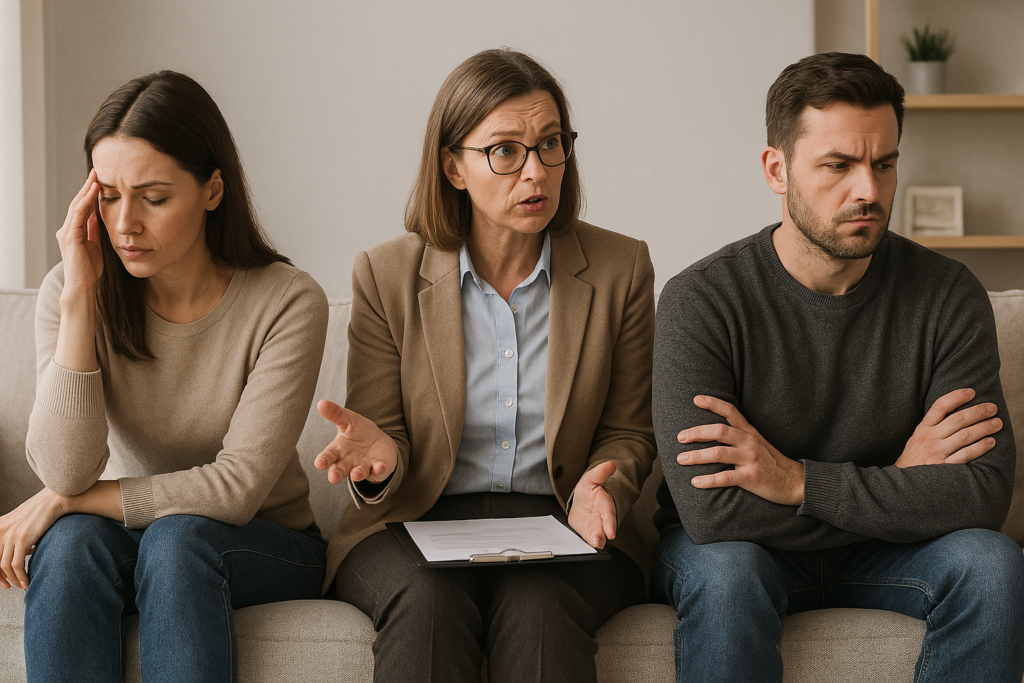Thinking about marriage counseling? The statistics may surprise you. Studies reveal that 93% of couples who attend marriage counseling still divorce within four years. Additionally, nearly half of U.S. marriages end despite therapy, and 38% of couples report worsened relationships post-counseling. If you’re considering couples therapy, it’s essential to understand why traditional counseling often falls short.
The Harsh Reality of Marriage Counseling
Marriage counseling is often seen as the last hope for struggling couples, but the numbers tell a different story. While counseling can offer communication tools, statistics reveal a shocking truth: it often does more harm than good. Here’s why:
93% of couples who attend marriage counseling divorce within four years – a staggering failure rate.
Nearly 50% of marriages in the U.S. still end in divorce, despite easy access to therapy services.
38% of couples report their relationship deteriorated further within five years of attending counseling.
One-third of couples drop out of counseling after just a few sessions, often because the relationship ends during or soon after therapy begins.
30% of couples enter therapy with mixed agendas, where one partner is already considering separation, making success nearly impossible.
Couples wait an average of six years after problems begin before seeking counseling, reducing the effectiveness of intervention.
Why Does Marriage Counseling Fail So Often?
Marriage counseling isn’t inherently flawed, but several key issues make it ineffective for many couples.
1. Couples Seek Help Too Late
Most couples wait until their relationship is in serious trouble before seeking counseling. By this point, resentment has built up, and emotional connections may be severely damaged, making it harder to rebuild trust and intimacy.
2. One Partner May Have Already Given Up
In many cases, one spouse has already decided to leave the relationship before counseling begins. If both partners aren’t equally invested in saving the marriage, therapy is unlikely to succeed.
3. Therapists Focus on Communication, Not Core Issues
While communication skills are important, they don’t address the root cause of marital problems. Deep-seated issues like unresolved trauma, emotional detachment, and personal growth imbalances often remain unaddressed.
4. Temporary Improvement, No Lasting Change
Couples often experience short-term relief after a few counseling sessions, but once therapy ends, old habits and patterns resurface. Without practical, long-term strategies, the progress made in counseling quickly fades.
5. Lack of Individual Accountability
Marriage counseling typically focuses on the relationship as a unit, but true change requires personal accountability. If both partners aren’t willing to work on themselves individually, the marriage cannot heal effectively.
What Works Better Than Traditional Marriage Counseling?
If traditional marriage counseling isn’t the answer, what is? Here are alternative approaches that have proven to be more effective:
1. Individual Therapy Before Couples Therapy
When both partners work on themselves first, they gain personal insight and emotional stability, which can lead to a healthier relationship dynamic.
2. Relationship Coaching
Unlike traditional therapy, relationship coaching focuses on actionable strategies and real-time problem-solving instead of past traumas.
3. Marriage Retreats and Intensive Programs
Couples who attend focused marriage retreats often see faster and more lasting results than those who go through weekly therapy sessions.
4. Commitment-Based Approaches
Programs designed to rebuild trust and rekindle emotional bonds through structured, commitment-focused exercises are often more successful than conventional therapy.
5. Preventative Relationship Maintenance
Instead of waiting until the relationship is in crisis, couples who regularly invest in their marriage through workshops, books, and proactive conversations often avoid the need for counseling altogether.
The Final Verdict: Should You Try Marriage Counseling?
Marriage counseling isn’t necessarily bad, but it’s not a guaranteed solution. If you and your partner are struggling, consider alternative approaches that address deeper relationship dynamics. The key to saving a marriage isn’t just therapy—it’s intentional, proactive effort from both partners.
Instead of waiting for problems to escalate, start investing in your relationship today. Whether through personal development, coaching, or structured relationship programs, taking action now can make all the difference in your marriage’s future.
